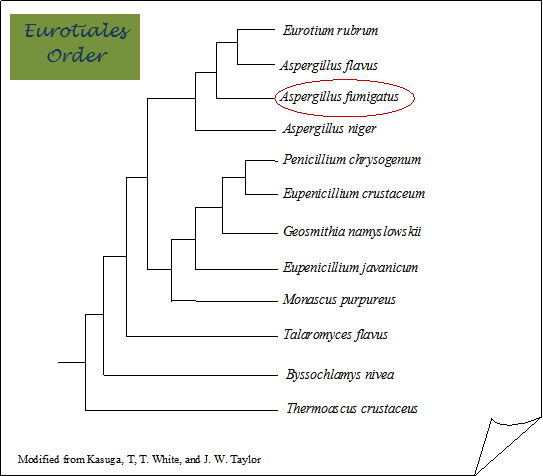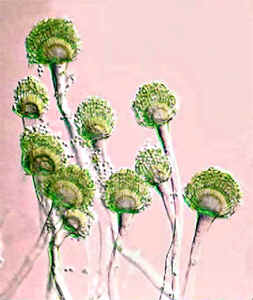How is it Classified?
Fungi are often characterized by their reproduction traits. Aspergillus fumigatus does not have a known sexual cycle, but it does have certain genes that link it to sexual reproduction and the sexual reproduction found in other close relatives (Bennett, J.W. and M.A. Klich 1992). Therefore, the following classification scheme is used.
-Kingdom-
Fungi
Members
of this kingdom are eukaryotic, heterotrophic, nonvascular, store food as
glycogen, have no chloroplasts present, and have cell walls of
chitin.
-Phylum-Ascomycota (sac fungi)
Members of the omycota generally have both sexual and asexual reproduction, formation of ascospores (internally born sexual spores) within structures called asci (elongated bundles of ascospores), presence of ascocarp structures (a cup-like dikaryon structure attached with asci), and presence of conidia (externally born asexual spores).-Class-Ascomycetes
This class are usually labeled with the presence of sexual spores called asci within an ascus in all members.
-Order- Eurotiales (blue and green molds)
Members have scattered asci located on the surface of the ascocarp and presence of a closed ascocarp.
-Family-Trichocomaceae
This family usually presents tuft of threads that release the ascospores after the asci degrades.
-Genus- Aspergillus
Species within this genus are mostly found in highly aerobic environments. Many are plant or animal symbionts, and many are food contaminants.
-Species- Aspergillus fumigatus
This is the most common pathogenic species within the genus. Sexual reproduction is unknown. It is known for causing aspergillosis immunocompromised individuals.
Phylogenetic Tree

This phylogenetic tree represents some of the species in the Eurotiales order. It was completed using molecular data, specifically the SSU rDNA gene. Aspergillus fumigatus is circled in red and is found close to Aspergillus niger which is used industrially to make citric acid. Also, note the presence of Penicillium chrysogenum, which is commonly used to produce antibiotic drugs called Penicillin. Given the diversity of applications of these fungi, one should recognize the significance of these organisms regardless of their size.
